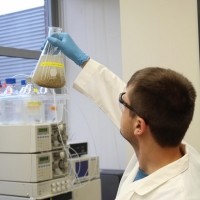Study points to new natural rye bran alternative to synthetic preservatives

According to Food Insight's 2018 online consumer survey of 1,009 Americans aged 18 to 80, consumers have a strong preference for no artificial ingredients, and are willing to pay for it: 7 in 10 consumers would be willing to give up a familiar favorite product for one that did not contain artificial ingredients. Of those who would, 4 in 10 would be willing to pay 50% more and 1 in 5 would pay 100% more.
"Currently, there's a big push within the food industry to replace synthetic ingredients with natural alternatives, and this is being driven by consumers," said Andrew S. Elder, doctoral candidate in food science, and co-author of a new study published in the journal Food Chemistry.
"Consumers want clean labels -- they want synthetic chemical-sounding ingredients removed because of the fact that they don't recognize them, and that some of them (the ingredients) have purported toxicity."
The Penn State researchers studied a class of compounds called alkylresorcinols (AR) naturally produced in plants such as wheat, rye, and barley, that prevent mold, bacteria, and other organisms from growing on the grain kernels.
"There are not many natural alternatives for synthetic antioxidants," Elder said. "Our work is focused on identifying new natural antioxidants to extend the shelf life of food and meet consumer demands."
Previous research has linked ARs to protection against cancer among humans, a review published in European Food Research and Technology found. From a food waste standpoint, ARs are found in the rye bran component typically discarded by many cereal plants.
"Bran is often a waste stream. We're taking something that's usually discarded in a waste stream and turning it into something useful," added Elder.
Natural preservative effect on omega-3 fatty acids
In the latest study, researchers set out to find if ARs could preserve food and extend shelf life in the same way from a chemical standpoint. Antioxidants such as ARs can slow the rate of food degradation, especially with foods
containing healthy fats and oils, and preserve the health benefits, they noted.
Researchers studied the antioxidant activity of rye bran extract containing ARs in an oil-in-water emulsion, as lipid containing foods (such as items fortified with omega-3 fatty acids) are more susceptible to food spoilage and generally have a shorter shelf life. The researchers chose to study AR action in emulsions because most people consume oils as emulsions, such as salad dressings.
"Most people consume omega-3s from marine sources," said Elder. "As they break down, they can make the product smell and taste fishy. Consumers then throw these products out and don't buy them again, and this results in an economic loss."
The research team developed a technique to extract and purify ARs from rye bran, then studied how well ARs were able to preserve omega-3-rich oils in emulsions, where two fluids do not fully mix.
The researchers found that ARs did act as antioxidants in an emulsion, preventing omega-3 oils from spoiling as rapidly as they did in emulsions with no antioxidants added. However, when researchers compared the rye bran ARs to two antioxidants widely used by the food industry - alpha-tocopherol (Vitamin E), a natural antioxidant; and butylated hydroxytoluene, a synthetic antioxidant - the ARs were not as effective as the natural or the synthetic antioxidant.
Although the ARs did not work as well as other antioxidants in this round of experiments, the researchers noted that their AR extracts were not completely pure, which could have reduced their effectiveness. In addition, they used a blend of different ARs that had different molecular structures.
Future work looking at different types of ARs will reveal whether an individual AR type is more or less effective than conventionally-used antioxidants.
"We hope that one day this work will lead to ARs being available on the market and provide more options for the food industry to use," Elder added.

















